Subscribe: Apple Podcasts | Stitcher | Google Play | Spotify
In 2007, Michelle Wenke and Megan George set out to create the anti-Juicy Couture.
“We wanted to be able to wear sweatsuits that catered to people like us, where they weren’t so loud and bubble-gummy,’” Wenke said on the latest Glossy Podcast. “We wanted them to look a little more like streamlined and low-key, and not just [be about] hot colors and graphics and bedazzled everywhere. We were a lot younger, so we didn’t really have this grandiose plan. We just were like, ‘Let’s try it out.’”
In the 13 years since, their L.A.-based loungewear brand Monrow has been sold by more than 500 boutiques and department stores, including Neiman Marcus and Shopbop, and worn by celebrities from Oprah to Gwyneth Paltrow.
Wenke and George discussed how they’ve self-funded Monrow, how they’ve differentiated in the newly crowded sweats market and how they’ve accommodated their new e-commerce shoppers, which grew from 30% of their customer base to 50% during the pandemic.
Here are a few highlights from the conversation, which have been lightly edited for clarity.
The perks of focusing on DTC
Wenke: “We went back to the essence of what we felt Monrow was. Because we had so much to draw from, we went back to the basics and decided to keep things simple. It really gave us a voice again, where we were like, ‘OK, we don’t have to really listen to our wholesale partners as much,’ because [those partnerships] were kind of going out the window last March; they didn’t know what was going on. So we just decided to do what felt true to Monrow and to what people want from the direct-to-consumer [experience]. And it really just streamlined things which, as a business owner, is always what you want to get back to. … It just gave us that confidence back. You don’t have that doubt anymore — when you’re so in that hamster wheel of creating for so many different customers, you’re always doubting yourself. And you’re always worried about what’s right for what [client]. Well, nothing’s right for everybody. But we know what’s right for the core Monrow customer and [we know] our voice. It was a really nice pause in the wholesale world.”
What’s working to acquire and keep customers
Wenke: “Marketing-wise, we’re leaning into all the [channels] everybody else is — Facebook, Google, affiliate marketing, influencers. We’re still doing all that stuff, if not more so. But the reason we have such a leg up [on other brands] is the familiarity of the brand and that it’s stood the test of time. People know it and love it, so we’re just [focused on] getting it out there more — and [ensuring] the brand recognition matches up with the actual product, where people are really getting something of quality… Making new variations on sweats every month, sometimes twice a month, is not easy. We’re always trying to reinvent what we know people want from us, with slight changes. We want to constantly give the consumer a reason to keep buying more athleisure, sweats, whatever you want to call it.”
On dodging pandemic-driven inventory problems
Wenke: “There was a tidal wave [of merchandise]. Within two days, over $1 million dollars in [wholesale] orders was just canceled. But we saw a shift to our e-commerce [channel], because the demand for sweatpants and sweatshirts and T-shirts just started to skyrocket. So we shifted all that merchandise to e-commerce. And we feel very grateful that we had the right kind of merchandise that was in such demand.”




